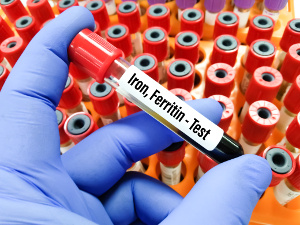Iron’s role in sports performance
 Iron is vital for red blood cells and their ability to carry oxygen, for energy turnover, and for muscle function. For those reasons, iron is highly important for athletes because iron deficiency anemia impairs your performance. Still, iron deficiency is quite common, especially in connection with endurance sports and menstrual bleeding. A plant-based diet and low stomach acid can also increase the risk of becoming iron-deficient. In a new review article that is published in Life, a group of scientists has looked at iron and iron supplementation and how it can affect athletic performance.
Iron is vital for red blood cells and their ability to carry oxygen, for energy turnover, and for muscle function. For those reasons, iron is highly important for athletes because iron deficiency anemia impairs your performance. Still, iron deficiency is quite common, especially in connection with endurance sports and menstrual bleeding. A plant-based diet and low stomach acid can also increase the risk of becoming iron-deficient. In a new review article that is published in Life, a group of scientists has looked at iron and iron supplementation and how it can affect athletic performance.
The authors have reviewed 11 relevant articles that were collected from the PubMed database. These articles are about iron’s importance for running, cycling, rowing, and other sports disciplines such as volleyball and triathlon that require muscle strength and endurance. The aim of the review article was to look closer at ways to improve the body’s iron status and other markers that affect our iron metabolism.
Iron is an essential mineral that is primarily involved in the red blood cells’ oxygen-binding hemoglobin. Myoglobin takes over the oxygen from the hemoglobin and binds it in muscle tissue, and then oxygen eventually enters the muscle cells. Here, the cellular powerhouses (mitochondria) employ oxygen in respiration processes and energy production. Iron also supports various enzymes, DNA synthesis, the immune defense, brain, skin, hair, and nails.
Iron is important for numerous chemical processes because its ions are able to donate and receive electrons. Excessive iron can be toxic, especially if the iron occurs in the form of free radicals that can attack cells and cause inflammation and cell death.
To avoid these unwanted reactions, iron is carried in the blood by a transport protein called transferrin. Excess iron is stored as ferritin in the liver, in the spleen, and in the bone marrow. Ferritin is the most frequently used biomarker of the body’s iron status.
The body needs somewhere between 9-15 mg of iron per day. The body’s iron balance is carefully regulated by hepcidin, a peptide hormone that is produced in the liver.
People who live or exercise in places high above sea level automatically have increased levels of hemoglobin and a subsequent increase in the production of erythropoietin (also known as EPO). Increased EPO steps up the production of red blood cells in the bone marrow. Consequently, high-altitude training increases the blood formation, the energy turnover, and the performance. People who engage in high-altitude training should make sure their ferritin levels are higher (above 50 ng/mL) because of the increased need for iron in low-oxygen surroundings.
Iron deficiency lowers your performance and many other functions
Iron deficiency can occur with or without anemia. Iron deficiency without anemia occurs when ferritin levels (according to WHO) are low (under 30 mcg/L) and hemoglobin levels are normal (above 130/120 g/L for men/women). But the jury is still out with regarding to setting optimal ferritin levels for athletes.
Iron deficiency is quite common among athletes and is caused by several factors such as increased energy turnover, loss of iron during training due to hemolysis (the breakdown of red blood cells), perspiration, etc. In addition, women are vulnerable to iron deficiency because they lose blood during their menstrual period.
Also, many athletes eat too few calories or don’t eat a sufficiently balanced diet with enough iron sources. It is also important to mention that the iron from a plant-based diet does not get absorbed as easily as iron from animal foods. This problem is very relevant now because of the vegetarian/vegan trend.
Low stomach acid, antacid use, and too little vitamin C can also inhibit the body’s ability to absorb iron.
Iron deficiency impairs many of the functions that are needed by athletes for optimal performance. They risk impaired physical performance, poor coordination and concentration, tiredness, mood swings, impaired immune defense, infections, and poor recovery after training and competition.
How to treat iron deficiency
If you are iron-deficient, you should make sure to get plenty of iron from a healthy, balanced, and varied diet. It is easier for the body to absorb iron from animal sources (heme iron) such as liver, meat, and eggs than non-heme iron from plant foods like wholegrains, spinach, and red beets. According to the review article, iron supplements work best in athletes with low iron status, and the effect is greatest in those with an actual iron deficiency.
High-altitude training may call for iron supplementation because it helps optimize the body’s EPO production. This is also the case if you already have normal iron deposits. But iron supplements should be taken with caution.
It is also important to eat a diet with enough calories because this is important for the synthesis of hepcidin that regulates the body’s iron status. In addition, having optimal levels of vitamin D and vitamin B12 contributes to an improved iron status by way of other mechanisms, and this also helps prevent anemia. Because iron works as a free radical catalyst, it is also important to get plenty of protective antioxidants that can protect against this.
Reference:
Andrea Solberg and Håkon Reikvam. Iron Status and Physical Performance in Athletes. Life (Basel) 2023 Oct.
TIP! See also the related articles
No matching tags.- Created on .








